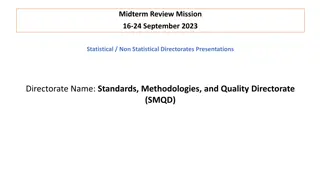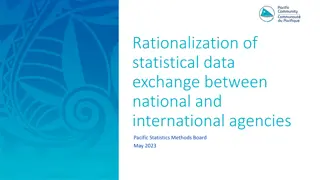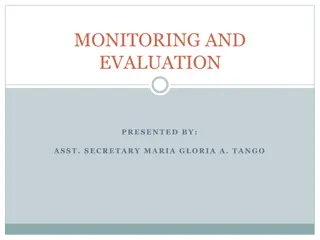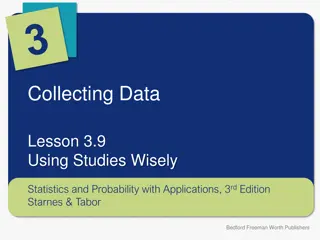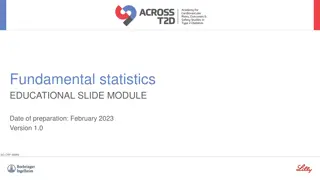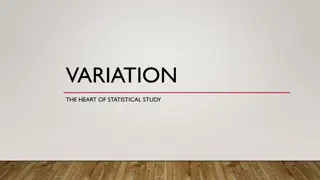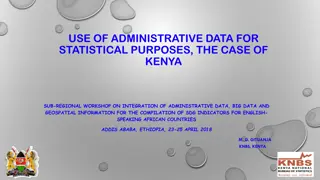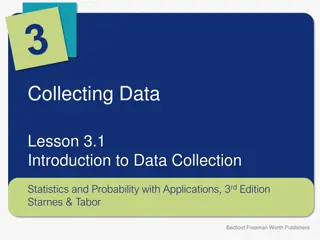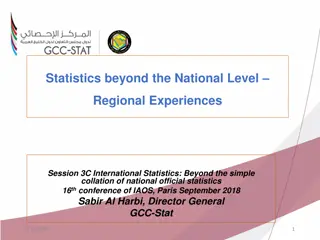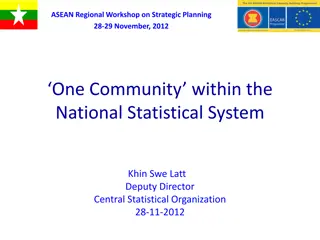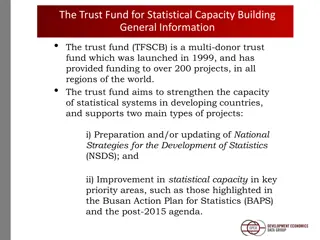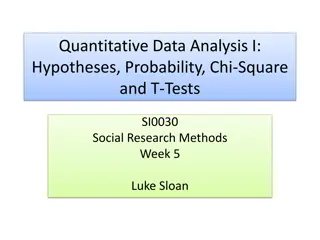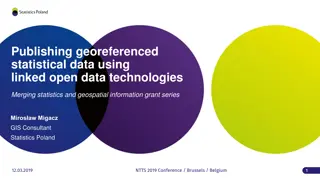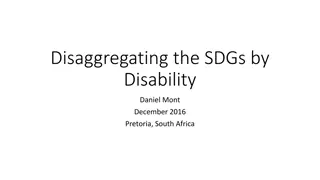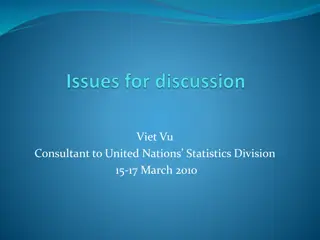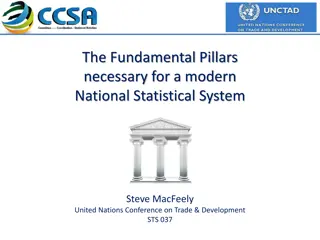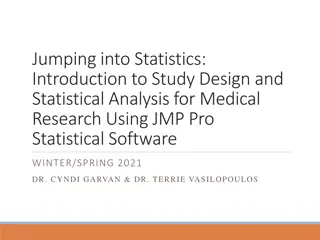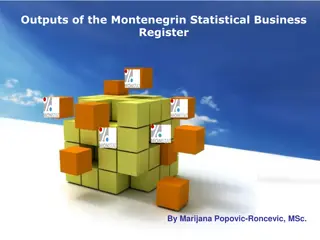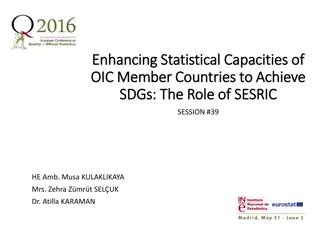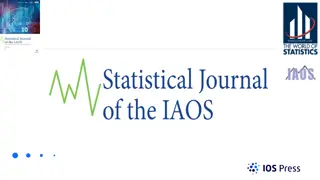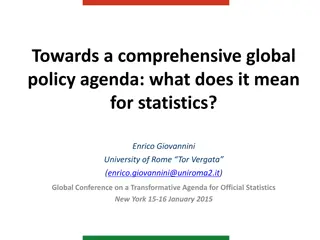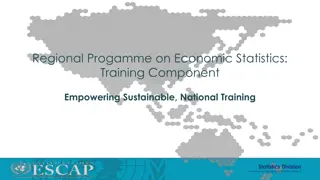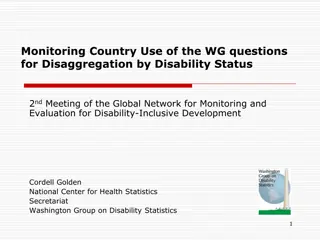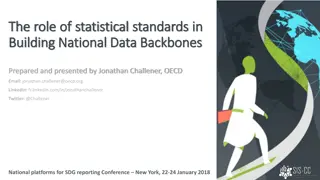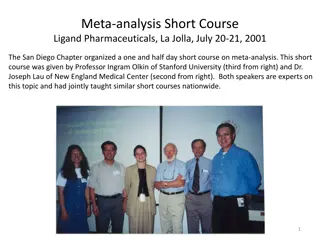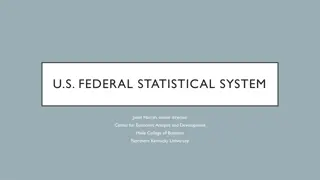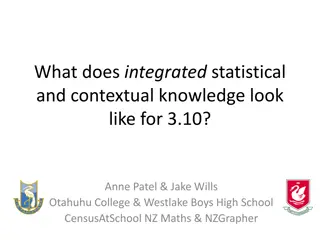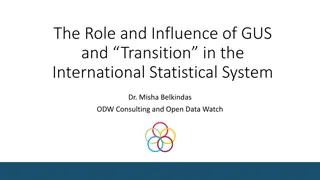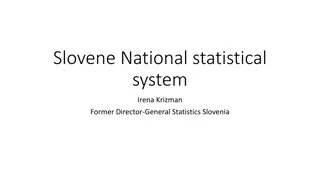Development of Guidance on the Role of NSOs in Achieving National Climate Objectives
The Task Force on the Role of NSOs in Achieving National Climate Objectives, led by Malgorzata Cwiek from the United Nations Economic Commission for Europe, aims to provide guidance for National Statistical Offices on contributing to national climate goals. With active members from various countries
1 views • 19 slides
Standards, Methodologies, and Quality in Statistical Programs and Services
This presentation highlights the role of the Standards, Methodologies, and Quality Directorate in overseeing statistical programs and services. It covers topics such as quality assurance, sampling frames, statistical classifications, and user satisfaction surveys. The directorate collaborates with v
1 views • 13 slides
Biostatistician Expert Offering Statistical Support and Training at CAMH
Marcos Sanches is a biostatistician at Biostatistic Core, CAMH, dedicated to enhancing the statistical quality of research projects. With expertise in various study designs, statistical techniques, and software, Marcos provides support throughout the project lifecycle, from grant applications to dat
5 views • 7 slides
Rationalization of statistical data exchange between national and international agencies
The discussion revolves around rationalizing statistical data exchange processes between national and international agencies, focusing on the challenges, principles, and proposed strategies to streamline reporting and dissemination. Key points include the complexity of data flows, burden of internat
1 views • 10 slides
Effective Monitoring and Evaluation Practices in Program Management
Asst. Secretary Maria Gloria A. Tango presents on the importance of setting up Monitoring and Evaluation (M&E) systems, showcasing practices, challenges, and opportunities in the M&E process. The presentation highlights the roles of central offices, regional offices, and the Institute of Labor Studi
0 views • 9 slides
Understanding the Scope of Inference in Statistical Studies
Statistical studies require careful consideration of the scope of inference to draw valid conclusions. Researchers need to determine if the study design allows generalization to the population or establishes cause and effect relationships. For example, a study on the effects of cartoons on children'
1 views • 15 slides
Understanding Statistical Methods for Clinical Endpoints in Diabetes Research
This educational slide module delves into fundamental statistics for analyzing clinical endpoints in diabetes research. It covers the choice of statistical methods, the distinction between statistical and clinical significance, and the importance of different endpoints in evaluating clinical benefit
1 views • 37 slides
Understanding Hypothesis Testing in Statistical Analysis
Statistical analysis aims to make inferences about populations based on sample data. Hypothesis testing is a crucial aspect where decisions are made regarding accepting or rejecting specific values or parameters. Statistical and parametric hypotheses, null hypotheses, and decision problems are key c
1 views • 34 slides
Statistics for Managers: A Comprehensive Course Overview
This course aims to equip managers with statistical skills to analyze data effectively and make informed decisions in various management areas. It covers topics such as measures of central tendency, statistical models, and the importance of statistical analysis in improving business decisions. The i
2 views • 15 slides
Understanding Degrees of Freedom in Statistical Models
Exploring the concept of degrees of freedom in statistical modeling, this presentation discusses the importance of having adequate degrees of freedom for model fitting and interpretation. It compares different models with varying degrees of freedom, illustrating how a null model with zero parameters
0 views • 27 slides
Understanding Variation in Statistical Studies
Variability is key in statistical studies, shaping the essence of statistical analysis. Students often struggle to grasp the concept of variability, despite being taught statistical methods. The term "variation" takes on different meanings in various statistical contexts, presenting challenges in co
2 views • 54 slides
Utilizing Administrative Data for Statistical Analysis in Kenya's National Statistical System
Kenya National Bureau of Statistics (KNBS) employs administrative data for statistical purposes, as highlighted in the sub-regional workshop on integrating administrative data, big data, and geospatial information for compiling SDG indicators. The legal and institutional framework, data collection m
0 views • 21 slides
Introduction to Data Collection & Statistics: Understanding Statistical Questions, Population, and Sampling
This material introduces the fundamental concepts of data collection and statistics. Learning objectives include distinguishing statistical questions, identifying populations and samples, and understanding the difference between observational studies and experiments. It discusses the process of stat
1 views • 14 slides
Enhancing Regional Integration Through Statistical Collaboration in the GCC
Regional statistics play a crucial role in informing regional policies, monitoring progress, and assessing developmental outcomes. The Gulf Cooperation Council (GCC) has established GCC-Stat as a regional statistics center to meet statistical requirements at the GCC level. By improving regional data
7 views • 8 slides
Exploring the Power of Wise Queries in Statistical Learning
Dive into the world of statistical learning with a focus on the impact of wise queries. Discover how statistical problems are approached, the significance of statistical queries, and the comparisons between wise and unary queries. Explore the implications for PAC learning and uncover key insights in
0 views • 8 slides
Understanding IBM SPSS for Statistical Analysis
IBM SPSS, formerly known as Statistical Package for the Social Sciences, is a powerful software package for statistical analysis used by researchers across various industries. Developed in the late 1960s, SPSS offers features for data management, statistical analysis, and data documentation. It simp
1 views • 13 slides
Overview of Myanmar Statistical System and Central Statistical Organization
The Myanmar Statistical System operates as a decentralized system with the Central Statistical Organization playing a crucial role at the national level. Various surveys and data collection efforts are undertaken by different ministries and agencies, coordinated by the CSO. The CSO compiles and pres
0 views • 18 slides
The Trust Fund for Statistical Capacity Building
The Trust Fund for Statistical Capacity Building (TFSCB) is a multi-donor trust fund launched in 1999, supporting over 200 projects worldwide to strengthen statistical systems in developing countries. It focuses on national strategy development and improving statistical capacity in key priority area
1 views • 5 slides
Understanding Hypotheses, Probability, and Statistical Tests in Social Research
This content delves into formulating hypotheses in social science, selecting statistical tests based on variables' measurement levels, understanding probability in statistical analysis, and distinguishing between null and alternative hypotheses. It emphasizes the research process involving hypothesi
5 views • 21 slides
Development of Guidelines for Publishing Georeferenced Statistical Data Using Linked Open Data Technologies
Development of guidelines for publishing statistical data as linked open data, merging statistics and geospatial information, with a primary focus on preparing a background for LOD implementation in official statistics. The project aims to identify data sources, harmonize statistical units, transfor
2 views • 31 slides
Disaggregating the SDGs by Disability: Capacity of Statistical Offices
Investigating national statistical offices' capacity to disaggregate SDG indicators by disability status. Determined suitable indicators, surveyed countries, and found underestimation in ability. Some countries reported inability despite having suitable tools, while others planned to utilize the Was
0 views • 14 slides
Institutional Arrangement for GRP Compilation: Challenges and Solutions
The content discusses the institutional arrangement for compiling Gross Regional Products (GRPs) by either regional statistical offices or National Statistical Offices (NSO). It highlights the pros and cons of both approaches, focusing on factors like regional demand, fiscal constraints, data accura
0 views • 5 slides
Building Modern National Statistical Systems: Key Pillars and Challenges
Exploring the essential pillars for a modern National Statistical System, including legal framework, institutional coordination, and data infrastructure. Emphasizing the complexity of economic processes and the need for integrated approaches for statistical capacity building to meet SDG targets and
0 views • 10 slides
Jumping into Statistics: Study Design & Statistical Analysis in Medical Research
Explore the fundamentals of study design & research methodology, learn to select appropriate statistical tests, and practice statistical analysis using JMP Pro Software. Topics include research question formulation, statistical methods, regression, survival analysis, data visualization, and more. Un
0 views • 31 slides
Understanding Error Correction and Reproducibility in Science
Explore the importance of severe testing, statistical crisis of replication, and the American Statistical Association's stance on P-values in ensuring reproducibility and error correction in scientific research. Delve into the philosophical, statistical, and historical aspects of error statistical m
0 views • 63 slides
Understanding the Montenegrin Statistical Business Register
The Montenegrin Statistical Business Register plays a crucial role in producing economic statistics by serving as a directory for legal and statistical units. This live register undergoes continuous changes, with administrative and statistical sections ensuring consistency. The register updates data
0 views • 16 slides
Enhancing Statistical Capacities of OIC Member Countries to Achieve SDGs: The Role of SESRIC
This presentation discusses the importance of enhancing statistical capacities in OIC member countries to achieve Sustainable Development Goals (SDGs), with a focus on the role of SESRIC. It covers the evolution of statistical definitions, the use of Statistical Capacity Index (SCI) for analysis, an
2 views • 17 slides
Statistical Journal of IAOS: Insights and Trends
Statistical Journal of the IAOS (SJIAOS) serves as the central platform for advancing official statistics globally. In 2023, it featured 78 articles in four regular issues, emphasizing strategic themes, methodological advancements, and the importance of open access. While experiencing a decline in a
0 views • 15 slides
Enhancing Global Statistical Systems for Sustainable Development
The post-2015 development agenda emphasizes the need for a comprehensive global policy agenda, impacting statistical systems worldwide. This agenda seeks to improve data collection, coordinate international statistical efforts, and enhance national statistical systems by 2020 to support the Sustaina
0 views • 23 slides
Regional Programme on Economic Statistics Training Component
Empowering sustainable national statistical systems through the Regional Programme on Economic Statistics Training Component, which aims to strengthen capacity, enhance knowledge sharing, and improve economic statistics production in pilot countries like Cambodia, Nepal, and Laos. The project focuse
0 views • 16 slides
Statistical Genomics Lecture 5: Linear Algebra Homework Questions
Explore the concepts of random variables, covariance matrix, special matrices, and self-defined functions in statistical genomics through a series of homework questions. Gain insights into linear algebra and statistical genomics while working on Homework 1, analyzing the expectation and variance of
0 views • 22 slides
Monitoring Use of WG Questions for Disability Disaggregation
The Washington Group (WG) was established to address the need for population-based measures of disability and to incorporate disability into national statistical systems. Representatives from National Statistical Offices (NSOs) form the main constituency of the WG, with approximately 135 countries a
0 views • 24 slides
Role of Statistical Standards in Building National Data Backbones
The role of statistical standards in constructing national data backbones is crucial for efficient data dissemination and reporting, especially in the context of Sustainable Development Goals (SDGs). Statistical standards guide the orchestration of information flows within a national statistical net
0 views • 22 slides
Statistical Events in San Diego Area (2001-2003)
Several significant statistical events took place in the San Diego area between 2001 and 2003, featuring renowned speakers and experts in the field. These events covered topics such as meta-analysis, global atmospheric changes, statistical trends, and annual statistical career days. The gatherings p
0 views • 12 slides
Overview of the U.S. Federal Statistical System and Census Geography
The U.S. Federal Statistical System comprises 13 principal statistical agencies responsible for collecting and analyzing data across various sectors. The system includes agencies like the Bureau of Economic Analysis, Bureau of Labor Statistics, and U.S. Census Bureau. Geographic identifiers (GEOIDs
0 views • 94 slides
Enhancing Statistical Inference in Educational Investigations
This content delves into the importance of integrated statistical and contextual knowledge for achieving success in Level 3 NCEA statistics involving the statistical enquiry cycle. It emphasizes the essential steps of posing investigative questions, utilizing appropriate statistical methods, discuss
0 views • 26 slides
Evolution of GUS and Transition in Statistical System
Explore the historical journey of the General Statistical Office (GUS) in Poland, tracing its development from pre-1918 to modern times. Witness the pivotal role of GUS in transitioning to international standards, adopting new methodologies, and spearheading innovative statistical practices. Discove
0 views • 13 slides
Slovene National Statistical System Overview
The Slovene National Statistical System comprises institutions like the Statistical Office of the Republic of Slovenia and various advisory committees responsible for producing official statistical data following European and UN standards. It emphasizes neutrality, objectivity, transparency, and con
0 views • 9 slides
Overview of Political Party Primaries and Nomination Processes
This content discusses the process of political party primaries, where enrolled members vote for candidates by secret ballot for various offices or town committee members. It covers details such as meeting formats, election schedules, types of primaries, eligible offices, and procedures for petition
0 views • 19 slides
Statistical Tools for Method Validation in USP General Chapter 1210
In the USP General Chapter 1210, Statistical Tools for Method Validation are outlined, serving as a companion to the validation of Compendial Procedures. The chapter covers important topics like Accuracy, Precision, Linearity, LOD, LOQ, and range. It emphasizes statistical tools such as TOST, statis
0 views • 22 slides

